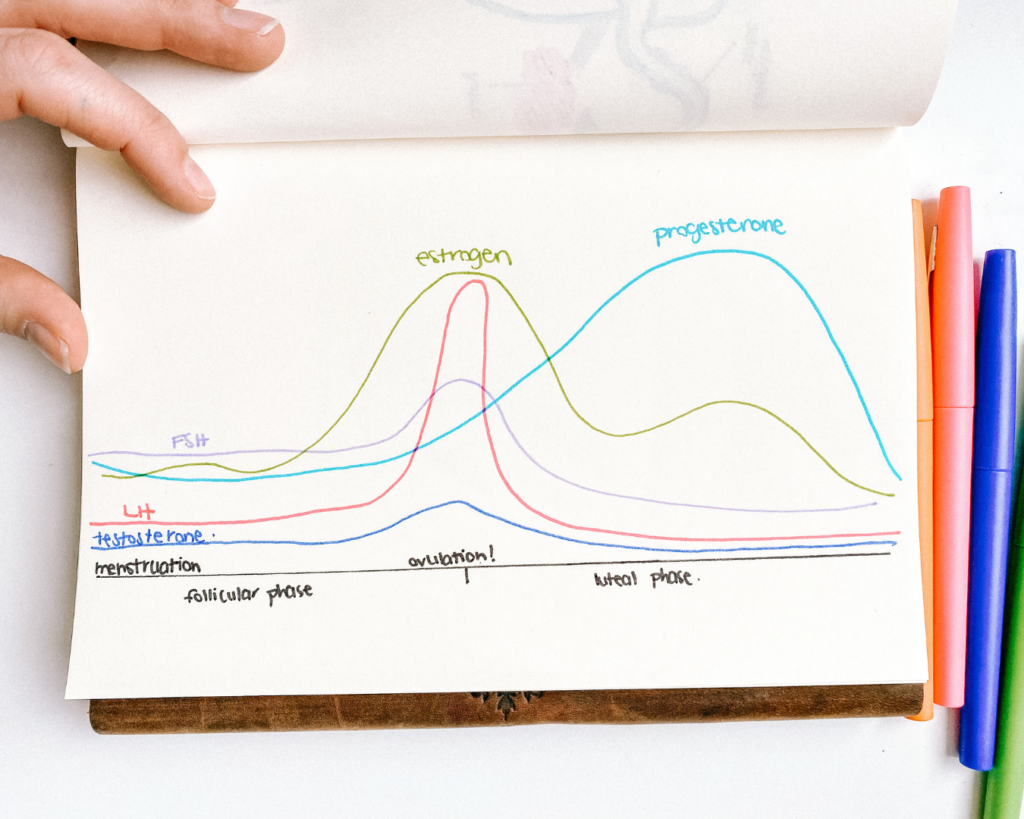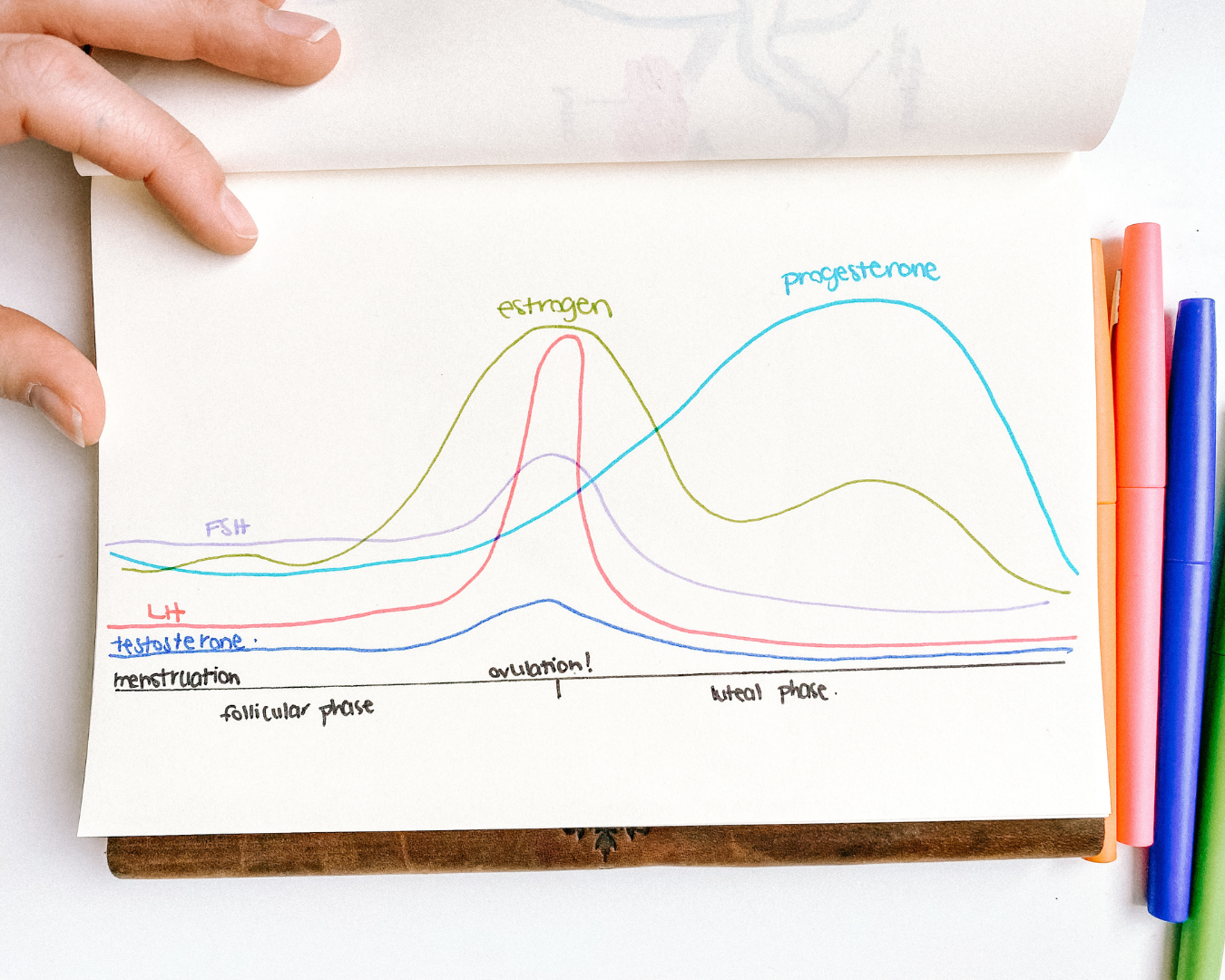What’s happening in our bodies hormonally?
Charting your menstrual cycle and living cyclically makes more sense when you know exactly what’s happening in your body. Each month (or cycle) our hormones do a very predictable dance, and when we know the steps our moods, feelings and reactions feel a lot more predictable.
Because the fact is women and menstruators are the more predictable sex. We’re just not taught what our bodies are doing beyond bleeding and cramping every few weeks.
Our menstrual cycle can be divided into two halves: the follicular phase, which begins during menstruation until ovulation, and the luteal phase, which begins the day after ovulation until the day before you begin fully bleeding again.
What happens during the follicular & luteal phases?
Here’s an overview of what our brilliant, magical bodies do:
- The main event of our menstrual cycle is actually ovulation. We don’t bleed without ovulating first (unless you’re on hormonal birth control, then your bleed each month is actually a withdrawal bleed from the synthetic hormones in the pill or coil). Ovulation is our fifth vital sign, an indicator of our overall health.
- Ovulation begins in the brain! With the release of FSH (follicle stimulating hormone) our brain signals to the ovary to begin, well, stimulating the follicles.
- As the follicles are stimulated, eggs grow and produce estrogen. One egg eventually becomes the dominant egg and creates a sudden, rapid rise of estrogen. This rapid rise of estrogen then signals back to the brain to reduce FSH and stimulate LH (luteinizing hormone).
- With this LH surge, the follicle with the dominant egg ruptures (yes, ruptures) and releases it into the fallopian tube, where the egg may or may not be fertilized.
- Around ovulation, we also have a small bump of testosterone.
- The ruptured follicle transforms into a corpus luteum and begins producing progesterone, that will support the theoretical pregnancy.
- If the egg is not fertilized within approximately 24 hours, it will die. Towards the end of your luteal phase as the body realizes it’s not been successful in getting pregnant, the remaining estrogen and progesterone will drop off and the uterine lining will begin to shed.
- The uterine lining shedding is the beginning of menstruation, and we’re back at the top of the cycle!

Irregular menstrual cycles
So what makes our cycles irregular within this hormonal rhythm? Many factors can contribute, but the key piece to remember is that ovulation begins in the brain! It’s fickle at times, being delayed by stress, illness, travel, poor diet, too much exercise, etc.
The follicular phase, or the first half of our cycle, is the part that may change in length. The days between the end of menstruation and ovulation can change in length as the follicles in your ovary are stimulated and produce estrogen. If we don’t have a rapid rise in estrogen, the brain won’t be triggered to release the LH surge needed to rupture the follicle and release the egg.
Women and menstruators with PCOS may chart multiple attempts at ovulation before they’re successful, or before they experience an anovulatory cycle (a cycle where ovulation does not occur, but a bleed happens because the built up uterine lining eventually becomes unstable and deteriorates).
Once ovulation does occur though, the luteal phase is wildly predictable. A healthy length of luteal phase is 9-18 days, but as you chart you will likely notice yours falls within a smaller average window. For me, as soon as I note ovulation has occurred, I know my period will come about two weeks later.
This predictability and familiarity I now have with my body gives me another level of awareness. When I feel sluggish after all the energy of ovulation, I know it’s the dip in my hormones. With my ADHD, I notice the lower levels of estrogen in the second half of my cycle and the effects it has on my brain and attention-span.
Do you notice the subtle (or not-so-subtle) shifts in your hormones over the month? Maybe now, you’ll picture the menstrual cycle hormonal graph week over week.
Tell me what stood out to you! Do you notice the changes in your hormones at any particular point? Chart the changes you note.
xx Lauren

[…] The phases of the menstrual cycle directly correlate with the rhythm of our hormones. The edges of each phase are defined by the shifts we experience as our brain and ovaries communicate. […]
[…] tuning into the four phases of your menstrual cycle and noticing the dance your hormones do month-over-month, and then charting your own experience with these cycles, we can begin to notice […]
[…] well-being, and how to then use the knowledge they gain to plan accordingly. When you understand how predictable your cycle actually is, then you can better prepare for upcoming events, social engagements, work projects, […]
[…] natural menstrual cycles. But by tuning into the four phases of your menstrual cycle and noticing the dance your hormones do month-over-month, and then charting your own experience with these cycles, we can begin to notice […]
[…] seasons can directly correlate with one of the four phases of our menstrual cycle. As our hormones fluctuate and shift over the month, our body experiences something similar to Mother Nature passing through her four […]